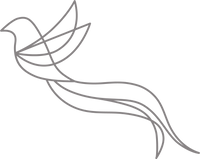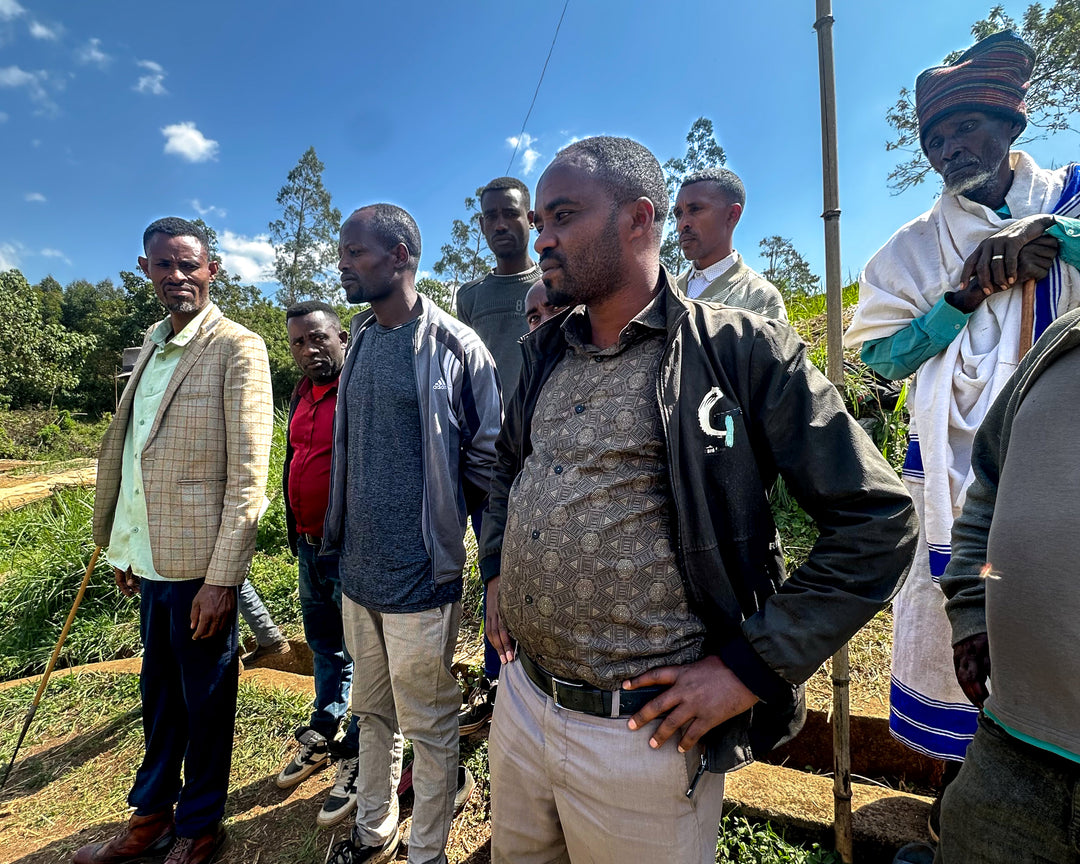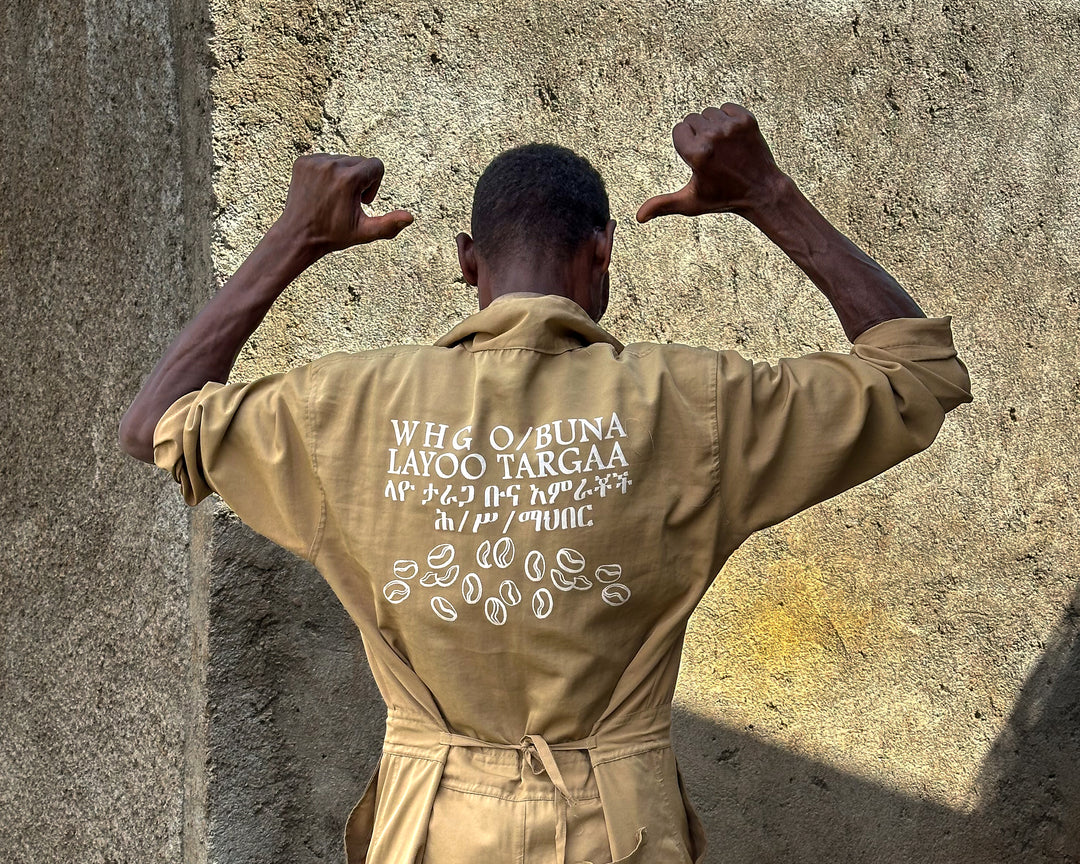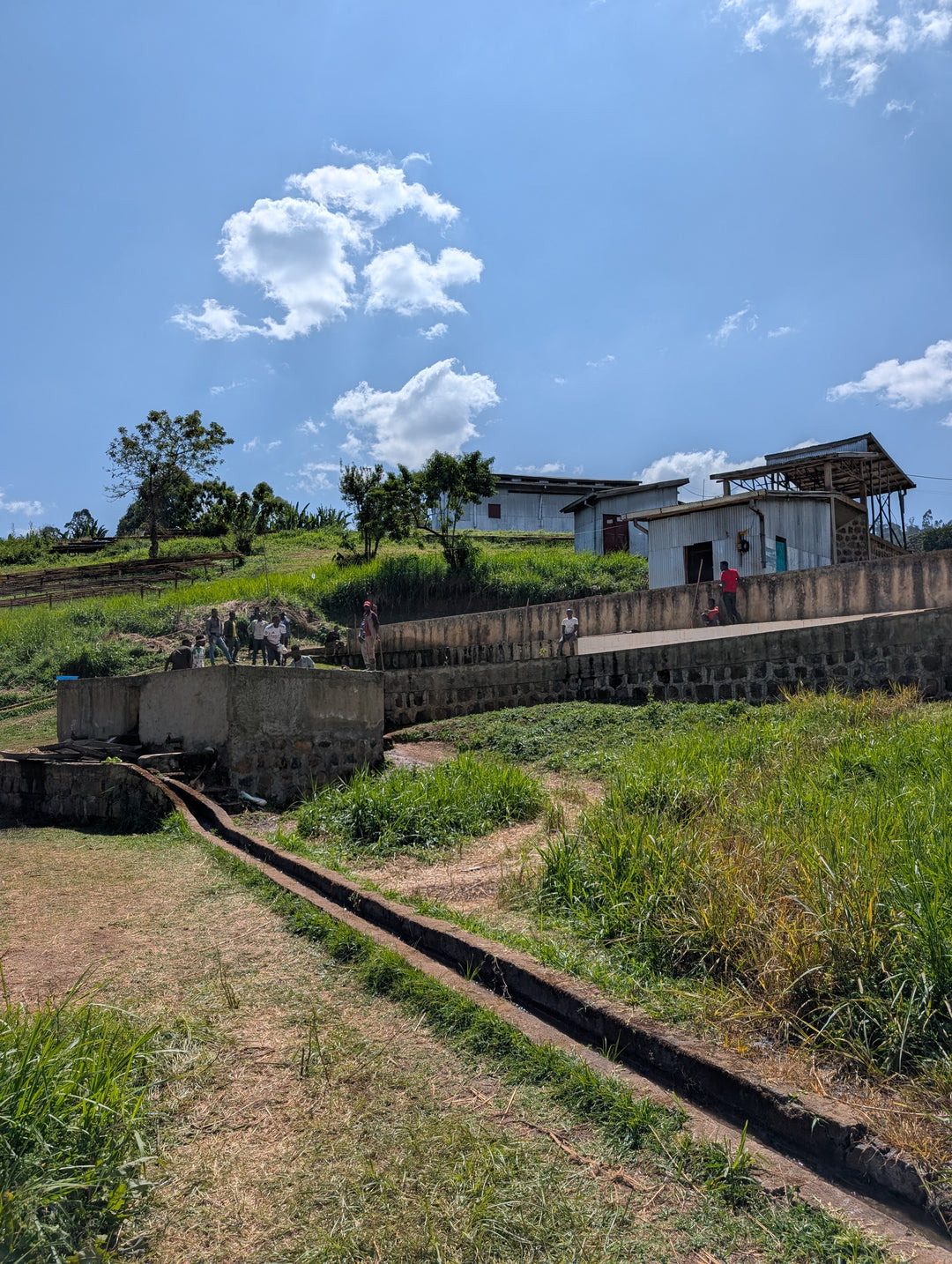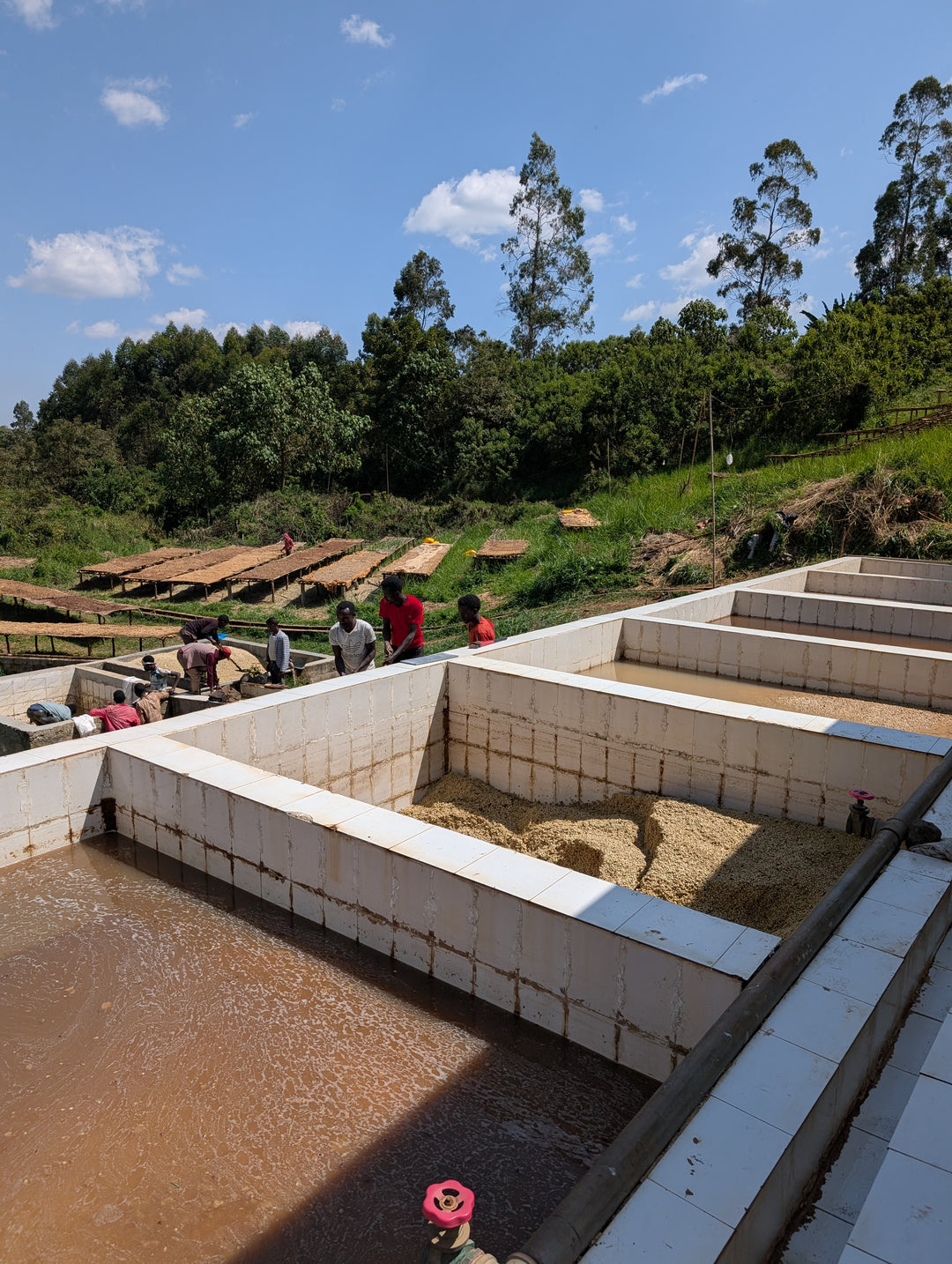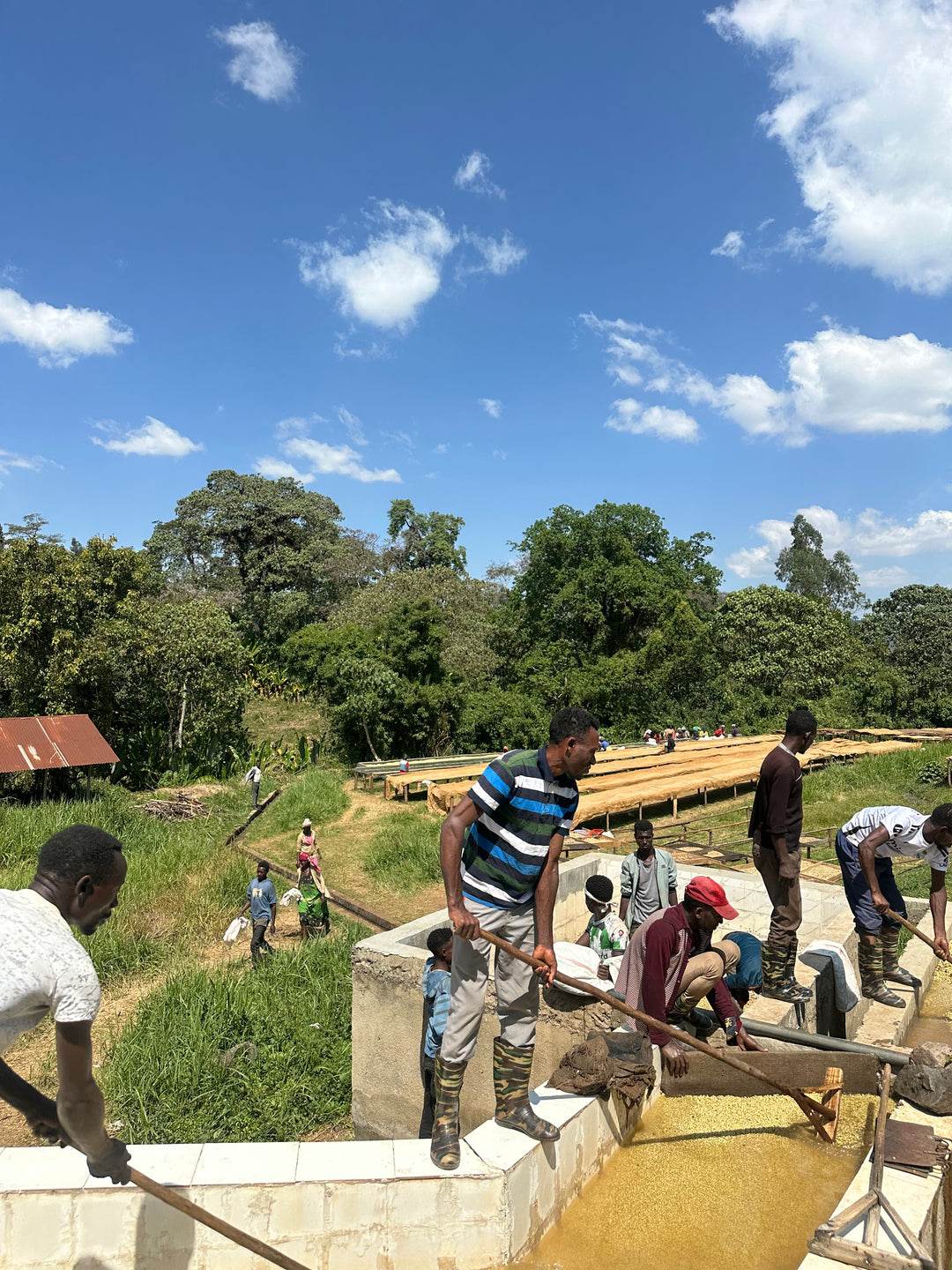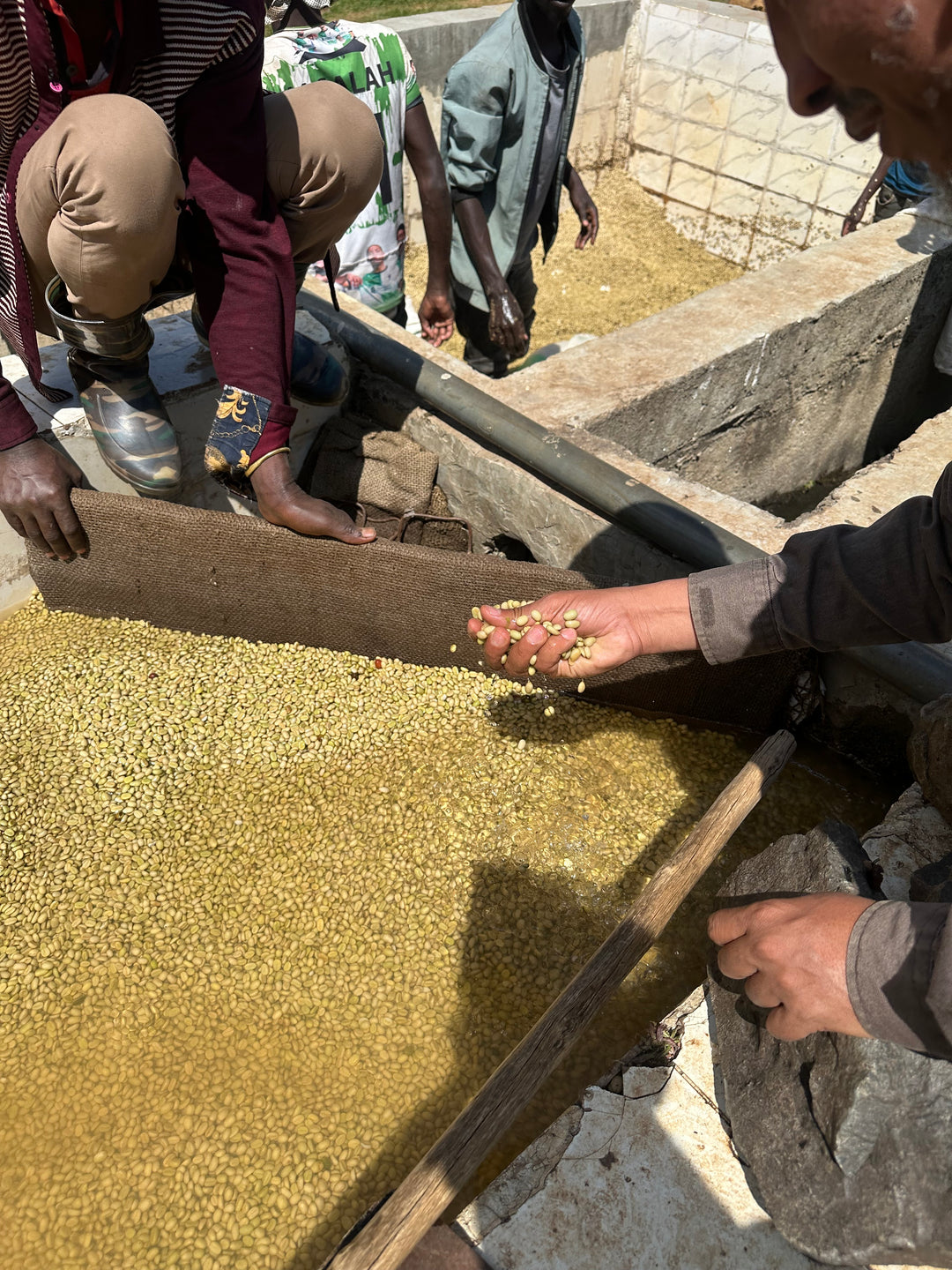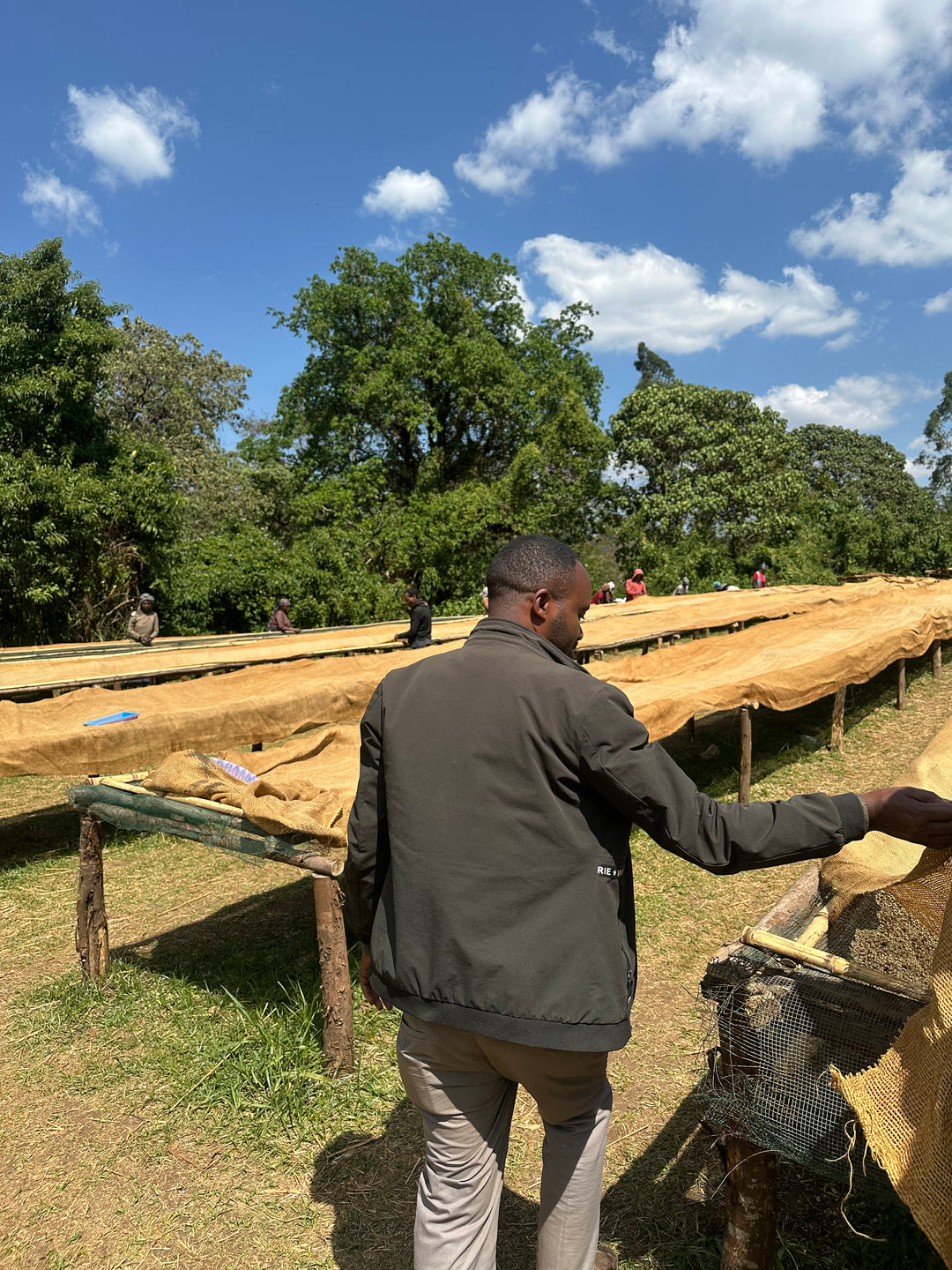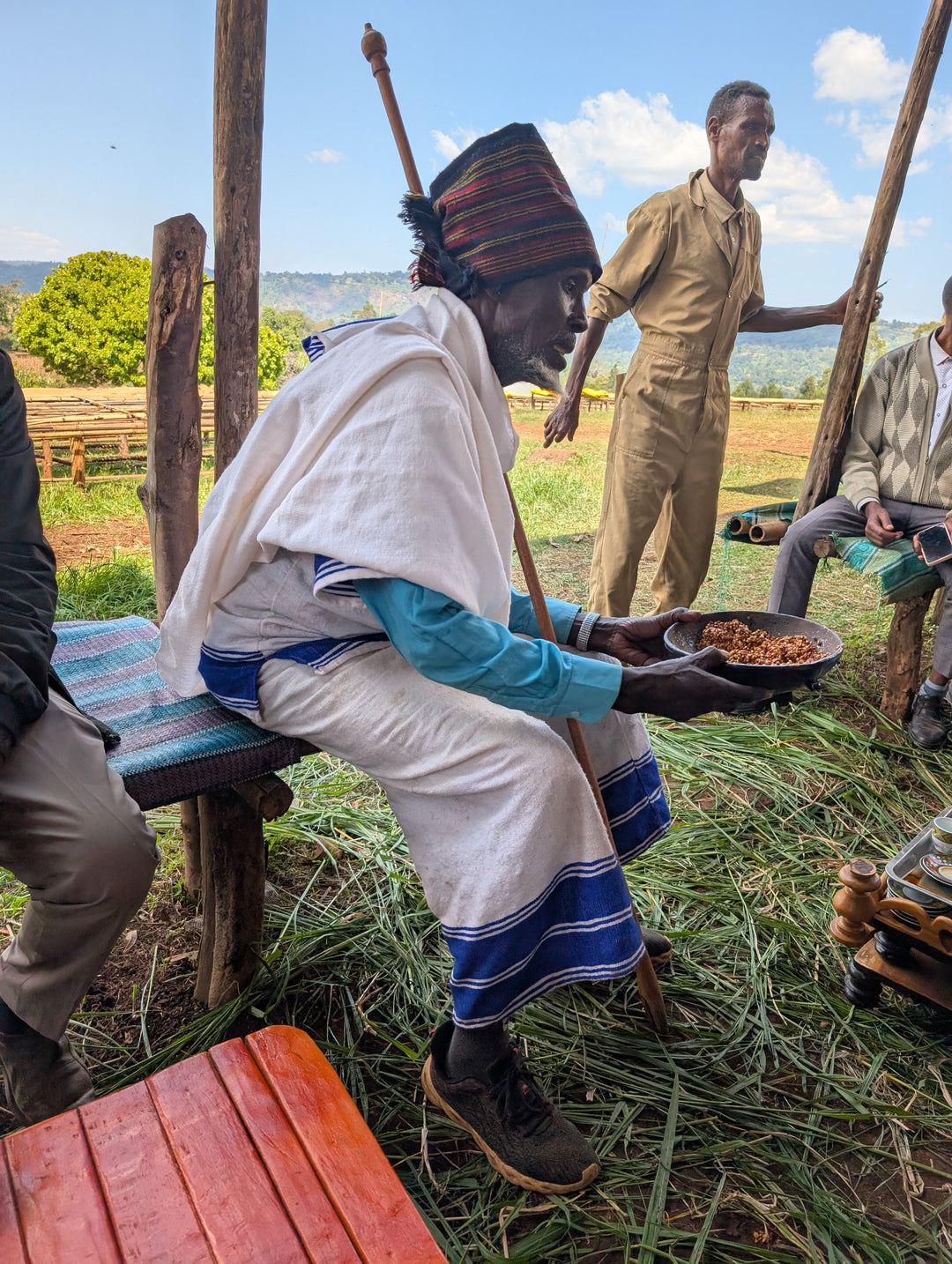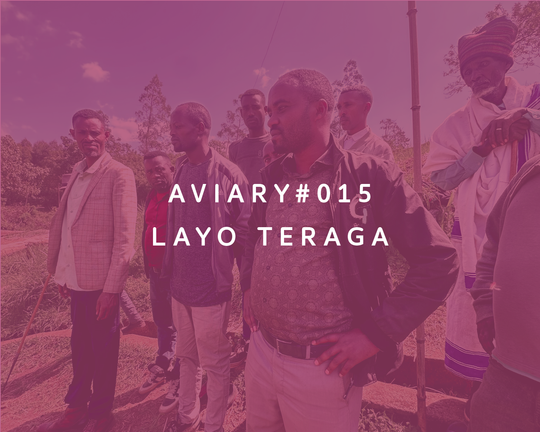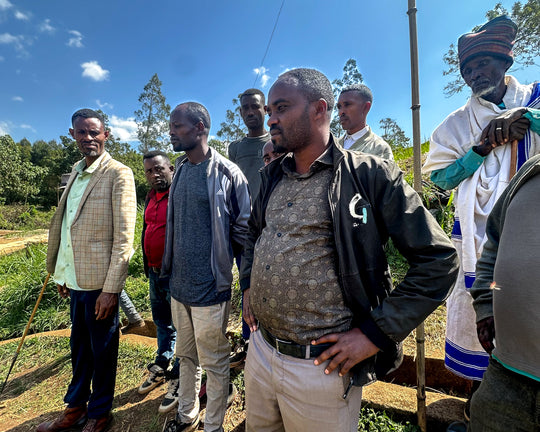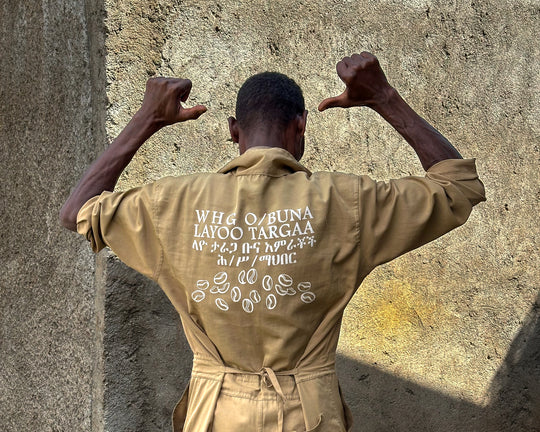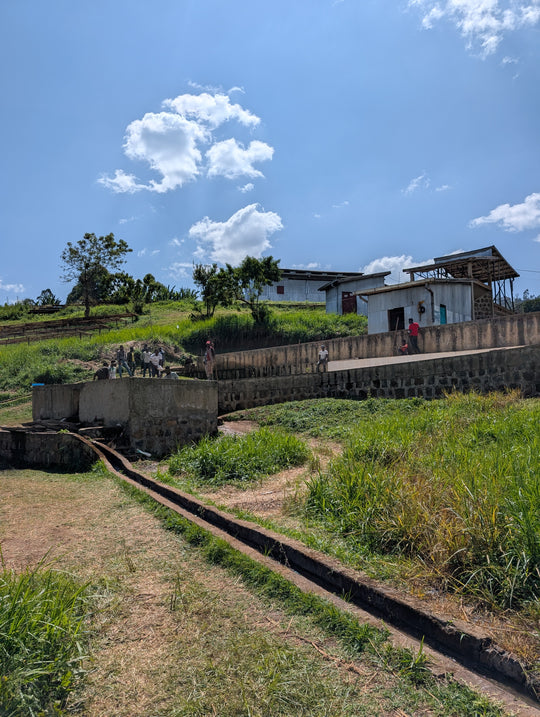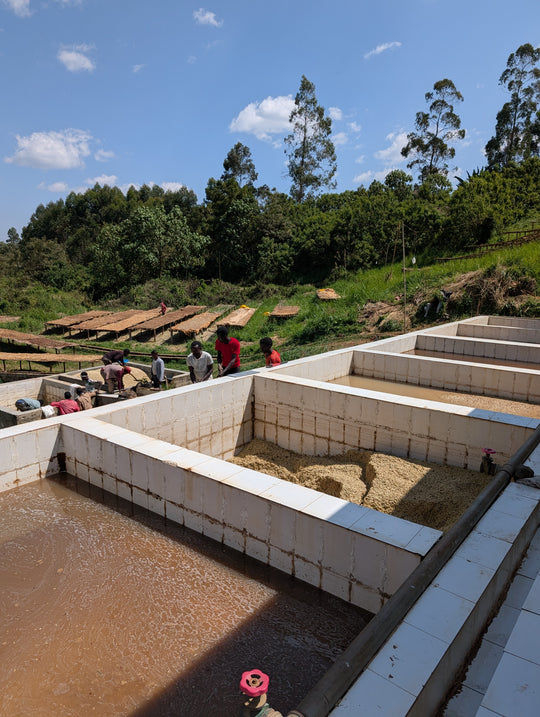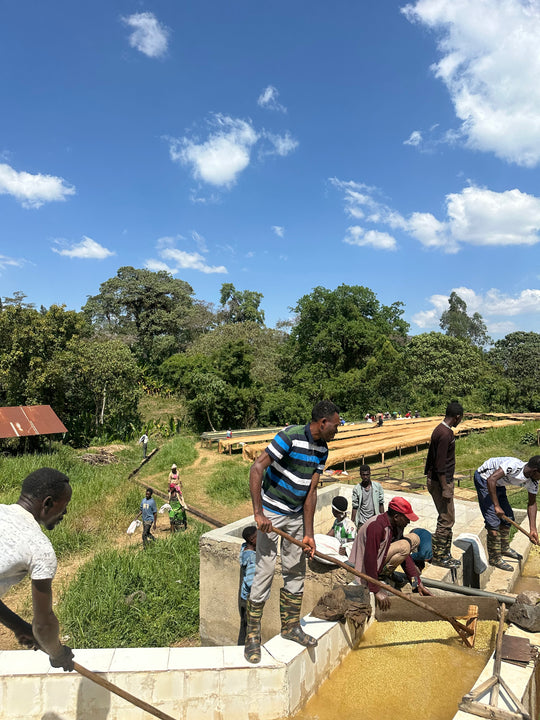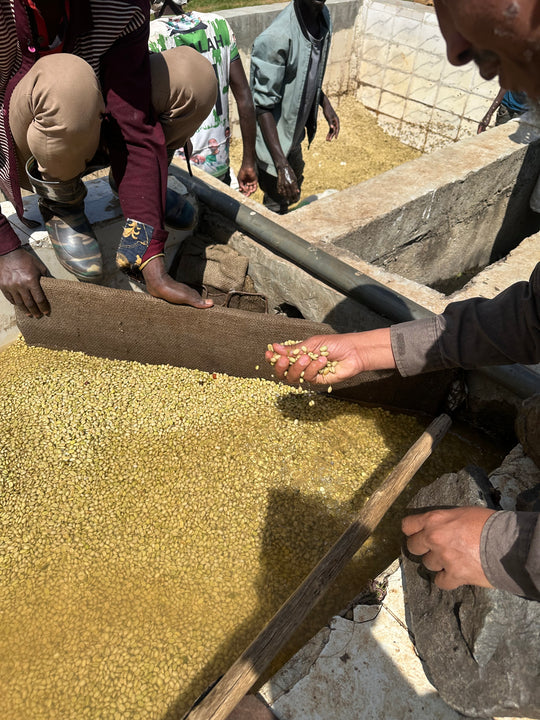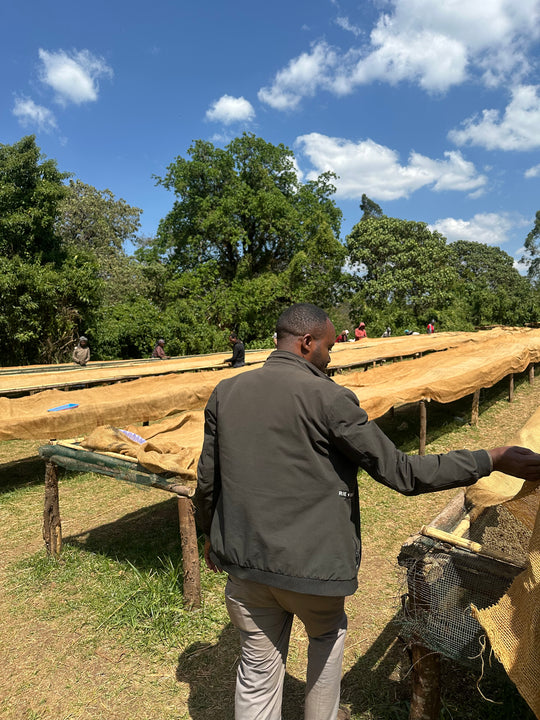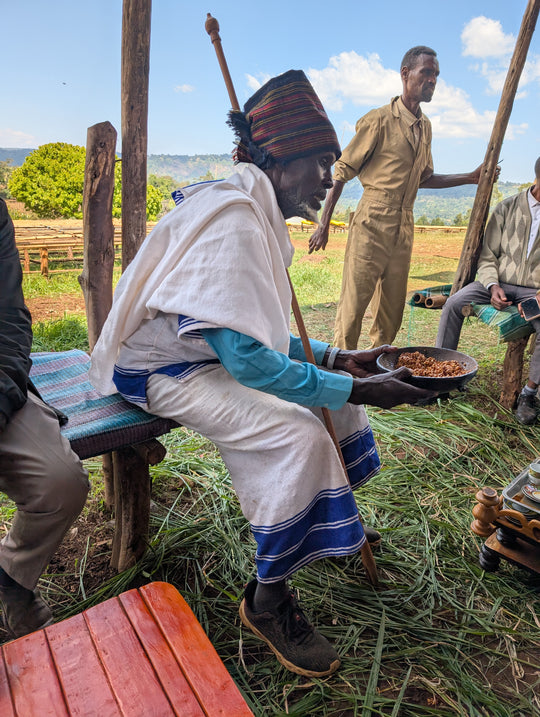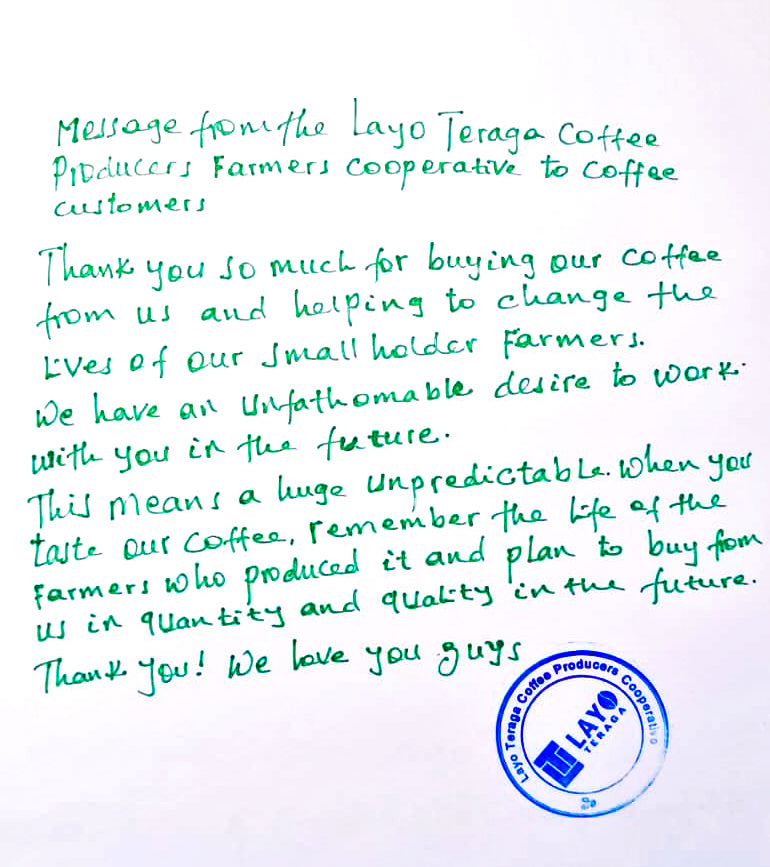015 - Layo Teraga
- Free U.S. shipping
2025 FREEZER SALE UPDATE (2025-12-17):
From Christopher: For 2025 in Ethiopia, I played favorites: Layo Teraga is my favorite cooperative in all of Ethiopia and every year produces some of my favorite coffees. The profile is one that is somewhat unfamiliar to many consumers relative to those coming from the highlands of Yirgacheffe or Agaro, but it rewards us in the cup with vibrant stonefruits, high acidity, and a rue-like fruity herbaciousness. I adore this coffee—and I'm excited to roast it again. For this re-release, we took the roast slightly lighter to allow the clean florality to punch through.
The sixth coffee of our 2025 season takes us to Uraga, Ethiopia, where the Layo Teraga cooperative and its 1814 smallholder members produce stunning traditional washed and natural coffee across three processing stations. This washed coffee comes from a two-week separation from Site 01, the cooperative's highest elevation station, and bursts with complex, fruited acidity.
From Christopher: "It's not difficult for me to pick favorites among Ethiopia's smallholder cooperatives: Layo Teraga stands alone not only for the quality of its coffee, but the professionalism and ambition of its management. The name 'Layo Teraga' comes from the words in the local language meaning 'fertile soil' and 'freedom fighter'—a portmanteau that appropriately describes the cooperative.
"In the Ethiopian export system, cooperatives have generally organized under the umbrella of a larger Union for the purposes of marketing and exporting their coffee. This structure provided specialized services for the cooperative, enabling them to focus on the production of coffee, while paying the Union to facilitate all other activities associated with the export. Not all Unions, however, serve their members equally—and additional layers within a transaction not only reduce transparency and efficiency but also introduce the opportunity for skimming, corruption and gamesmanship.
"But ahead of my first visit to Layo Teraga in 2022 while I was working to source coffee for Crop to Cup Coffee Importers, the cooperative had, with its sister cooperative in Yirgacheffe (Homa) broken away from its Union with the intention of directly exporting its coffee to buyers. By obtaining its own export license, the cooperative no longer relied on the Union to market or negotiate pricing for its coffee—and with the ability to receive USD as payment, could diversify its activities to include importation of products for sale in Ethiopia, improving the financial security of the cooperative—and thus, the prosperity of its members.
"The horizontal organization of smallholders into cooperatives or associations is one way that producers can access better-paying specialty markets, manage risk, and negotiate a higher price through collective bargaining. While these structures can take many forms—formal and informal—Ethiopia's cooperatives, particularly in the West, have for decades been a model of how well-run organizations can improve individual producer welfare.
"Because of the successes of its export and import activities, Layo Teraga—which operates a processing station in Boye and one in Koche in addition to its highest elevation site in Layo, which was built in 2011 and specializes in washed coffee—was able to not only last year able to pay a dividend payment to its members of 5 birr per kilogram of cherry, but has reinvested its profits in the community.
"The impact that a cooperative can have relative to an individual smallholder scales with success of each season. For this reason, winning loyalty and year-over-year purchasing from buyers is a priority of the cooperative's young management. The improvements and projects funded by the cooperative include: building the main road from in town (enabling easier delivery and movement of coffee and thus easier payment); an electric power station (to provide electricity for the stations and community), classrooms for children of the members; and a banking system providing advanced payments to members through the harvest for anticipated cherry delivery. As of this year, the cooperative had begun work to provide clean, potable water to the community.
"During my visit to Layo in December 2024, we asked for the cooperative to create two-week separations of the harvest in its warehouse to enable us to cup through and select the highest-quality lots for export. This coffee comes from a separation at the early end of the peak harvest and presents in the cup with vibrant tropical and stonefruit notes of apricot, peach and pineapple highlighted with jasmine and pink lemonade.
"I made a short documentary about my sourcing work for Crop to Cup in Ethiopia during the 2024-2025 season including a chapter on Layo Teraga. There, you can get a look at the processing station and more background about the cooperative."
This coffee was roasted the week of June 23, 2025 and again on December 18, 2025.
TASTING NOTES: Vibrant tropical and stonefruit notes of apricot, peach and pineapple highlighted with jasmine and pink lemonade
ROAST: Light, to accentuate the structured acidity and florality of this coffee and present its fruited character as ripe and juicy
ACIDITY: Structured, fruited, juicy and bright acidity
FUNK: This is a very clean, juicy coffee with no funk presenting during our evaluation
FOR FANS OF: Collective bargaining; high-grown traditional washed Ethiopians; smallholders; self-determination
FARMGATE PRICE: 90 birr per kg (initial payment) plus second payment at export (expected 4-8 birr per kg)
FOB PRICE: $4.80 per lb
LANDED PRICE: $6.35 per lb
This lot was produced with cherry collected during a two-week period in December 2024 from the cooperative's 1814 members; exact traceability is available as each delivery is recorded and registered not only for initial payment (in birr per kg) but also for distribution of a divided or second payment following export should the cooperative be profitable. As of December, approximately 500 of the registered members had delivered cherry to the highest elevation site.
The initial payment to members upon delivery is based on the local pricing; at the time of our visit, this was 90 birr per kg of cherry. While this is higher than in years past, as a result of the currency devaluation in July 2024 stemming from preconditions placed in the loan package from the IMF accepted by the Ethiopian government, this farmgate price represented a decrease in the total percentage value of the export price relative to previous years. Floating the currency was meant to align the exchange rate with black market rates, disincentivizing the black market exchange of currency and bringing more foreign currency into circulation as a way to solve the ongoing foreign currency shortage. Calculated using an exchange rate of 126.87 birr per kg (higher than last year's official rate of 57 or black market rate of 95-100), the farmgate price translates to roughly $1.93 per pound, or 40.2% of the export price.
From the remaining sum, the cooperative funds its staff (such as its general manager, industry manager and the 76 full-time workers at Site 01) and activities related to export (financing, dry milling, transportation, shipping). The cooperative received financing from the cooperative bank for the 2024-2025 season, enabling higher production overall and thus leading to anticipated profits. For the 2023-2024 season, the cooperative paid a dividend of 5 birr per kg.
Inflation reported by the government was 17%, down from the previous year (28%), but the effects of currency devaluation made inflationary effects feel more acute. Financing challenges meant that if they were willing to give agricultural loans at all banks assessed the value based on last year's export, in birr—regardless of devaluation. This meant that there was less financing available for purchasing cherry, suppressing the competition for cherry seen in previous years. Regardless, cherry prices ranged from 75-115 birr per kg through the season, reflective of devaluation and continued demand for USD, even as the South saw a larger-than-expected harvest.
The price the cooperative received ($4.80 per pound FOB) was higher than the C-market price ($3.26), even amid a record-breaking run, and was higher than the government's published minimum registration price ($4.51), the premium reflecting the quality of the coffee as well as a commitment to paying above long-term costs of production.
The high delta between FOB and landed price can be explained both through an increase in financing costs for 2024-2025 associated not only with a higher C-market but also higher risk, higher prime rates and an industry-wide liquidity crunch; payment to CoQua, Crop to Cup's exclusive partner in Ethiopia; and transportation via the Red Seas using MSC.
JARC selection 74110 coffee grown using organic methods at 2,200-2,400 masl in Uraga by 1814 smallholder members of the Layo Teraga cooperative; selectively hand-picked at peak ripeness; sorted; floated; pulped using a McKinnon disc pulper and graded by density; fermented under water for 40-48 hours in open concrete tanks; washed and graded using traditional channels; dried on raised beds for 12-15 days; conditioned in piles in the warehouse for 15-30 days.
I recommend resting this coffee for 3-5 weeks from its roasted date filter brewing and 5-6 weeks for espresso-style preparation (though you may wish to try it earlier to enjoy how the coffee changes and opens over time).
As filter, I prefer a ratio of 1:17 using low-agitation methods of extraction resulting in 22-23% EY.
